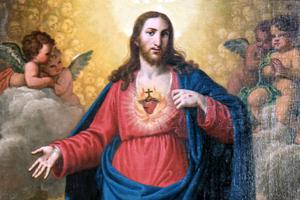The Sign of God We Bear Upon Our Lips
The philtrum is a reminder of the wonder we experience upon formally learning about things like the Scriptures, philosophy, science, history and math throughout our life.

The philtrum, also known as the medial cleft, is that adorably kissable indentation above our lips and below our noses. We are generally given to staring at them when presented with the faces of those we love.
In most mammals, the philtrum is a narrow groove that carries water-dissolved odors to the animal’s smell receptors. Nostrils do that also, but the philtrum helps in its own modest way as well. You might notice your cats and dogs also have philtrums — most therian mammals do except for the primates. Egg-laying mammals, known as monotremes, such as the platypus and the echidna, don’t have philtrums.
In humans, the philtrum is perfectly useless. Just another vestigial feature or organ like the appendix which has no apparent function. Or perhaps, it serves the most important of functions which its Creator planned all along.
In the Talmud (Masechet Niddah, 30b), when a baby is conceived, God sends forth an angel — perhaps the Archangel Michael — to teach the baby the entire Bible and all of the wonders and secrets of the universe and of God’s love, as he rests in his mother. When he finishes the lesson, the angel presses his finger to the child’s lips, forming the philtrum as a sign that he or she has indeed come to understand God in all his glory. The angel then admonishes the child to never reveal anything of what he has been told to any living creature. Upon birth, the infant will then forget all that he had been taught.
Consider that the moment of conception is also when God assigns a guardian angel to the tiny human. So, what with the baby, his guardian angel and the Archangel Michael, that’s a mighty crowded womb there. Considering the possibility of a twin or triplets situation, and you have yourself Nature’s own little commedia d’arte sitcom that would make the Marx Brothers’ crowded cabin skit in their A Night at the Opera look like a dignified, contemplative gathering. Perhaps Michael offers a group PowerPoint lecture when addressing any number of wombmates. That would certainly lower the number of angels present to a number who can comfortably dance on the head of that pin. It’s little wonder why there’s no womb at the inn.
Sorry… I couldn’t help myself. I’ll see myself out.
Some people might be familiar with this legend from Archangel Gabriel’s monologue — played masterfully by Christopher Walken — in the 1995 metaphysical thriller The Prophecy. In one scene, he explains to a bunch of children attracted to his angelic manner that he personally gave them their little dimple when he taught them the Bible and the other wonders of the universe. Frank McCloud, played by Humphrey Bogart, in Key Largo (1948) tells the same legend. Interestingly, the plot of Stephen King’s 2013 short story Afterlife is about a child born without forgetting any of his angel’s lessons.
An interesting and unavoidable point is brought up as to why the Archangel Michael would he wipe our memories clean of the lessons he just taught us. Perhaps the answer is revealed in the wonder we experience upon formally learning about Scriptures, logic, science, history or math later on in life. We are often transfixed when we learn about these wonders and the glory of God and of his mighty love for us. Without the angelic cram session in utero, perhaps we would reject all knowledge and wisdom as incomprehensible. Instead, in school, we hear it all for the second time and that’s when we are illuminated and converted. The knowledge is inside us, thanks to our angelic tutor’s prep session, and in giving ourselves over to study and contemplation, we feel as if we’ve come home and everything makes sense. Our philtrum thus serves as a sign that we await having our minds, hearts and lips open in praise of God’s wisdom and salvific plans.
It’s interesting to note that the philtrum is where we place our thumb when we cross our lips to prepare ourselves to hear the Gospel at every Mass.
Coincidence? There are no coincidences with God. God can’t be asleep at the wheel. He thinks of everything.
- Keywords:
- love of god















